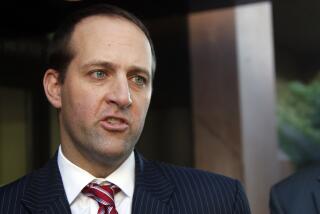Doctor acquitted of coverup in misallocated liver transplant
- Share via
Dr. Richard R. Lopez Jr., who once ran the liver transplant program at St. Vincent Medical Center, was acquitted by a federal jury Friday on charges that he led a conspiracy to cover up the misallocation of an organ in 2003.
Lopez has acknowledged that he helped decide to take an organ intended for one patient and use it for another more than 50 places down the waiting list — a serious violation of transplant rules that prompted the hospital to shut down the program.
At issue was what role Lopez may have played in an extensive effort to hide the breach.
The Los Angeles hospital initially reported the name of the actual recipient to the United Network for Organ Sharing, which oversees transplantation nationwide. But later that day, the transplant staff retracted that notification and reported — falsely — that the liver had gone to the man for which it had been offered.
The hospital continued to file falsified documents, including a pathology report describing the liver that was supposedly removed from the intended patient.
Prosecutors alleged that Lopez, 56, had orchestrated the coverup. In an eight-count indictment, he was accused of conspiracy, concealment of material fact and falsification of records.
After a three-week trial, he was acquitted on all counts.
Lopez did not know that records had been falsified and became “a scapegoat for everything that was wrong at St. Vincent’s,” said his defense attorney, Kenneth Julian.
Julian said jurors told him after the trial that they did not believe Lopez was behind the coverup. But Assistant U.S. Atty. Beong-Soo Kim said jurors told him that the case had come down to a technical issue.
The organ-sharing network is a private nonprofit that is contracted by the U.S. Department of Health and Human Services. The defense had argued that the government did not have jurisdiction because it was the contractor that had been deceived.
“The jury didn’t believe the government had sufficiently proven federal jurisdiction, and that’s why they indicated they acquitted,” Kim said.
The patient for whom the liver was intended was at home in Saudi Arabia when the organ became available. The liver should have been offered to the next person on the waiting list, who was at UCLA Medical Center.
Instead, the organ went to another patient from Saudi Arabia.
More to Read
Sign up for Essential California
The most important California stories and recommendations in your inbox every morning.
You may occasionally receive promotional content from the Los Angeles Times.













